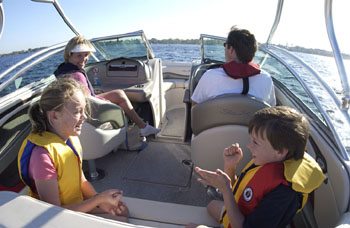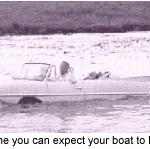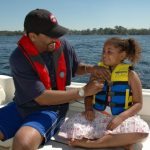A Commander Bob viewer once wrote to me with a question that confirmed my contention that more attention should be paid to the subject of boating safety for children. The viewer asked whether or not their infant should be strapped into a car seat during their frequent excursions on Chesapeake Bay. I wrote back and told him to leave the car seat in the car, and strap their child into an infant PFD instead.
If there is any focus to be amplified in discussions about Boating Safety, it would be directed to boating families to PLEASE make sure that children are wearing properly fitted and properly adjusted life jackets when they are anywhere near the water, on a pier, or aboard a vessel of any kind. Children below a certain age can’t make the decision as to whether or not they should wear a PFD, and it is absolutely imperative that parents realize their responsibility in this regard. A child can be lost overboard in a heartbeat, and the effect of that instant in time can devastate a family. It’s such an easy, inexpensive, and almost sure-fire way to enjoy the peace of mind that comes with knowing that the family will return safely from an outing on the water.
I have observed with my own daughter that children enjoy boating at various stages of their lives for different reasons. When they’re very young, they just like doing things that their grown-up role models like to do. (If Dad likes boating, then it must be fun.) Then, there comes a stage of ‘participation’. (If I go boating with Mom and Dad today, I may get to water-ski or be towed on the tube.) Later, parents may see a ‘primping’ stage, especially from female children. (The boat becomes a platform for showing off that new bikini to passing boats with cute boys aboard.) But the stage most frustrating to parents is the ‘reluctance’ stage, when children would rather do almost anything else than be with their parents in a boat. (Or anyplace else for that matter.) This is often the stage that causes serious reassessment of the family’s recreational lifestyle. (I wonder if we should get rid of the boat, the kids don’t seem to enjoy it any longer.)
I’m also a firm believer that children at any age above five should be assigned responsibilities on board the family boat. At earlier ages, those assignments could include helping Mom or Dad with the pre-underway checklist, stowing the bring-aboards in their proper places, and showing guests where the fire extinguishers and life jackets are located. As time, experience, and level of education increases, the duties can range from tending the lines and fenders, to acting as radio operator. By assigning duties, you help to involve your children in an important educational process, and if you make it fun, they’ll take great pride in being an important part of your crew. In my view, children will enjoy the family boating experience to a higher level for a much longer time, get less bored, and develop a sense for boating safety as they learn.
Of the most memorable experiences our family of three had on my boat were the evenings we’d spend at anchor in a quiet cove, relaxing before an overnight. Sometimes there’d be music coming from a distant shoreside cabaret, and on a cloudless night we’d just rock ourselves to sleep on the aft deck gazing up at the heavens. Although this would seem to appeal more to adults than to kids, my daughter thoroughly enjoyed this opportunity for uninterrupted bonding. I don’t know of any other time when all three of us slept so soundly, as those times with the waves lapping against the side of the boat and our cradle rocking us to a deep, restful sleep.
As far as Do’s and Don’ts, I guess this would be my list:
1. DO make sure each of your kids have a properly fitted and adjusted PFD with their name on it. For the youngsters, insist that they wear them. For older children, at least store them in the open within easy reach. DON’T rely on a child’s judgement when it comes to whether to wear a PFD, and DON’T abdicate your responsibility to provide them with this security.
2. DO sign your kids up for a basic boating safety course through the Coast Guard Auxiliary, local Power Squadron unit, Red Cross, or state boating law enforcement agency. DON’T overlook the important statistic that nearly 80% of boaters involved in fatal accidents have never taken a boating safety course.
3. DO everything possible to make your boat outings fun and educational for your family. DON’T forget to use every available opportunity to show your kids how to respect the waterways from the standpoints of safety, and protection of the environment.
Some additional tips when it comes to boating and kids:
1. Tie a polypropylene line on your throwable PFD. A child in the water for any reason will feel much more secure if the ring buoy or cushion you throw them is attached to Dad or Mom’s hand at the other end.
2. Teach the little ones how to help with duties on the boat, but also teach them that their hands and arms should be inside the boat when docking or maneuvering around solid objects like a pier.
3. Don’t let the kids ride on the deck, seatbacks, or gunwales. Going overboard is traumatic enough. Going overboard and making contact with the prop is disastrous. And speaking of the prop, if your kids are swimming near the boat, take the key out of the ignition switch.
4. Kids standing in high speed boats are accidents waiting to happen. Many serious head injuries have been caused by a quick drop of the throttle, throwing everyone forward in the boat. And, rapid acceleration has also thrown many passengers over the transom and into the dangerous area behind the boat.
Remember, there’s nothing to compare with a day in the warm sunshine, boating with your family. But also remember, there would be NOTHING that could compare to spending the rest of your life wishing that you had just buckled that little one into a personal flotation device. Worth taking the chance?







